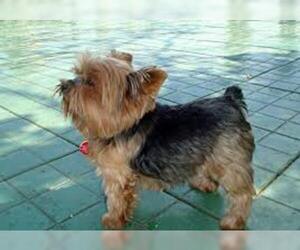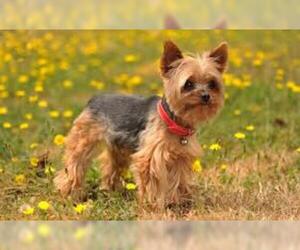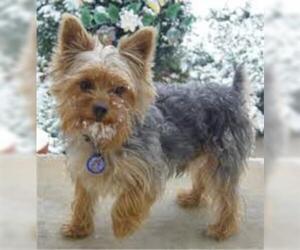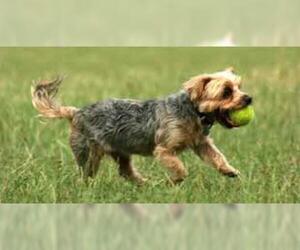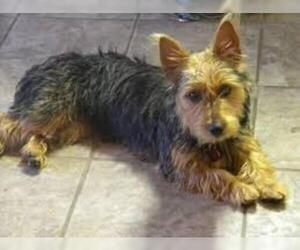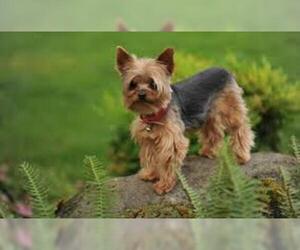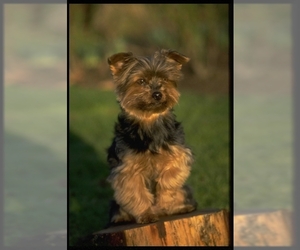
All about Yorkshire Terrier dog breed
A.K.A. :Yorkie, Yorkie Pup, YT, Broken-Haired Scotch Terrier, Toy Yorkie, Mini Yorkie, Yorkie Companion, Yorkie Rascal, Silky Yorkie, Yorkie Scout, Purse Pup, British Toy Terrier, Royal Yorkie, Pocket Terrier, Yorkie Fluff
Size
Grooming requirements
Exercise requirements
Good with other dogs
Watchdog ability
Energetic
Training requirements
Playful
Affectionate
Good with other pets
Good with children
Good with strangers
Winter
Summer
Healthiness
Protective
Life Span
| Pure Breeds | Member |
| Breeds A - Z | Y |
| Breeds by Group | Terrier Toy |
| Breeds by Trait | Hypoallergenic Low Shedding |
| Overview: | The Yorkshire Terrier, affectionately known as a "Yorkie," is a popular small dog breed originating from 19th-century Yorkshire, England, where they were initially used to catch rats in clothing mills. Despite their diminutive size, typically weighing between 4 to 7 pounds, they possess a big personality. Key physical characteristics include a compact body, a small head, and their most distinctive feature: a long, silky, straight coat that is a striking steel blue on the body and tail, and a rich golden tan on the head and chest. Temperamentally, Yorkies are known for being spunky, intelligent, and confident, often displaying a surprisingly bold nature. They are generally adaptable and can thrive in various living situations, making them well-suited for apartment living due to their small stature and moderate exercise needs. With proper socialization, they can be wonderful companions for families, though their delicate size means they are better suited to homes with older, more considerate children. Regarding health, like many small breeds, they can be predisposed to certain conditions such as patellar luxation, tracheal collapse, and dental issues, emphasizing the importance of regular veterinary care and a balanced diet. |
F.A.Q.
All You Need to Know About the Yorkshire Terrier Breed
The Yorkshire Terrier, affectionately known as a "Yorkie," originated in England, initially bred to catch rats in clothing mills. Today, these charming companions are renowned for their bold, confident, and affectionate temperament, making them fantastic lap dogs despite their terrier instincts. Physically, Yorkies are small, typically weighing between 4 to 7 pounds, with a distinctive long, silky, blue and tan coat that requires regular grooming to prevent matting. They are highly adaptable, perfect for apartment living and suitable for families with older children who understand how to interact gently with small dogs. While their exercise needs are modest, daily walks and playtime keep them happy. Common health considerations include luxating patella and dental issues, emphasizing the importance of a reputable breeder and routine vet care. A Yorkshire Terrier is a loyal, spirited, and loving addition to many homes.Yorkshire Terrier weight typically ranges from 4 to 7 pounds for healthy adults. While there isn't a significant size difference between males and females, individual dogs can vary within this range. This average size makes them a popular toy breed, with an emphasis on maintaining a healthy weight for Yorkshire Terrier to prevent health issues.
Curious about the Yorkshire Terrier height and their average size? You've come to the right place! When considering how tall is a Yorkshire Terrier, it's important to remember these charming dogs are a true toy breed, known for their compact dimensions.
The average height of a Yorkshire Terrier, measured at the shoulder (the highest point of their back between the shoulder blades), typically falls within a range of 7 to 8 inches. This standard is consistent across most reputable breed clubs and is a good guideline for what to expect from an adult Yorkie.While this range is generally accepted, you might encounter slight variations. For instance, some individual Yorkshire Terriers, due to unique genetics, might be a little under 7 inches or slightly over 8 inches. Gender can also play a minor role, with male Yorkies sometimes being at the higher end of the range compared to females, though this difference is often minimal and less pronounced than in larger breeds. Ultimately, the emphasis is on a well-proportioned, compact dog within this specified height guideline.So, if you're looking for a small, portable companion, a Yorkie's average height of 7-8 inches makes them an ideal fit for various living situations!The Yorkshire Terrier colors are traditionally steel blue and tan. This is the AKC recognized Yorkshire Terrier colors and the only coat type accepted by major kennel clubs like the AKC. The blue typically appears as a dark, glossy steel blue (not silver or grey), and the tan should be a rich, bright tan, not fawn or cream.Rare coat types and exotic Yorkshire Terrier variations exist but are not accepted in the show ring and can sometimes indicate mixed breeding or genetic anomalies. These include:* Parti Yorkshire Terriers: White, black, and tan patches. While not traditionally recognized, some registries accept them.* Chocolate Yorkshire Terriers: Solid chocolate brown instead of blue, with tan markings.* Golden Yorkshire Terriers: Primarily golden or light tan with minimal or absent blue.* Black & Tan Yorkshire Terriers: Born predominantly black with tan points, with the black usually fading to blue as they mature. If the black remains, it's considered non-standard.* Blue Yorkshire Terriers: Entirely blue or grey without tan.* Merle Yorkshire Terriers: This pattern (patches of diluted color) is not naturally occurring in purebred Yorkies and strongly suggests mixed breeding, often with breeds like the Chihuahua or Dachshund. These variations are not accepted by the AKC.
The Yorkshire Terrier personality is a delightful blend of confidence, affection, and spunk, often described as a "big dog in a small package." They are incredibly loyal companions, forming strong bonds with their families and often displaying a watchful, protective nature despite their diminutive size. Yorkies are generally very friendly and sociable, enjoying interaction and attention from their loved ones. They are highly adaptable, making them an excellent choice for apartment living as long as they receive adequate exercise and mental stimulation. Their intelligence and eagerness to please make them relatively easy to train, though their independent streak can sometimes lead to charming stubbornness. With children, Yorkies can be good companions, especially with older, respectful children who understand how to interact gently with small dogs. Supervision is always recommended. While generally tolerant, their small size means they can be easily injured by rough play. Regarding other pets, particularly other dogs, Yorkies often get along well, especially if socialized from a young age. However, their terrier instincts can sometimes lead them to chase smaller animals. Overall, the temperament of the Yorkshire Terrier is lively, affectionate, and intelligent, making them a charming and rewarding pet for the right family.
The Yorkshire Terrier temperament is a delightful blend of confidence, affection, and spunk, making them excellent companion dogs. Despite their small size, Yorkies possess a big personality! They are generally very friendly and sociable with their families and those they know well, displaying immense loyalty.
Yorkies are highly adaptable to apartment living, thriving in indoor environments as long as they receive adequate attention and daily walks. Their innate cleverness means they are quick learners, though they can exhibit a charming streak of stubbornness. Early socialization and consistent, positive reinforcement training are key.Regarding behavior with children, Yorkies can be good companions for older, respectful children who understand how to interact gently with a small dog. Due to their delicate build, supervision is crucial with very young children. With other pets, particularly other small dogs, they often get along well, but proper introductions are always recommended. They may display a typical terrier prey drive towards smaller animals like hamsters or birds.While generally robust in spirit, Yorkies can be somewhat sensitive to harsh tones or inconsistent treatment, responding best to a loving and gentle approach. Their courageous and curious nature, combined with their devoted affection, makes them wonderful, lively additions to many homes.Yorkshire Terrier Care: Essential Daily Maintenance & Health TipsCaring for a Yorkshire Terrier involves consistent daily maintenance to ensure a happy, healthy companion. These charming dogs require moderate grooming; their long, silky coat necessitates daily brushing to prevent mats and tangles. Professional grooming every 4-6 weeks for trims and tidy-ups is also recommended.Despite their energetic bursts, Yorkshire Terriers are generally a low-energy dog breed. Short, daily walks and indoor play are usually sufficient to meet their exercise needs. Due to their small size and delicate nature, they are not suited for strenuous activities or rough play.Dietary considerations are crucial for how to care for a Yorkshire Terrier. They thrive on a high-quality, small-breed dog food. Portion control is vital to prevent obesity, a common issue in smaller breeds. Treats should be given sparingly.Unlike some brachycephalic breeds, Yorkshire Terriers typically don't have deep facial wrinkles requiring special cleaning. However, regular ear cleaning is important to prevent infections, and dental care, including daily brushing, is paramount to combat periodontal disease, which they are prone to.Yorkshire Terriers are sensitive to extreme temperatures. Their small size makes them susceptible to cold, while their thick coat can lead to overheating in hot climates. Always provide adequate shelter and monitor them during outdoor excursions.Common health tips for Yorkshire Terrier owners include vigilance for skin issues (allergies, dry skin), diligent dental care, and weight management. Regular veterinary check-ups are essential for early detection and prevention of potential health concerns.
Yorkshire Terrier Activity Level: Balancing Zest with Rest
The Yorkshire Terrier activity level is often described as a charming paradox: they are small but mighty, possessing surprising bursts of energy followed by long periods of contented rest. This makes their exercise needs quite manageable for most households.Typically, Yorkies are not high-energy dogs requiring extensive daily runs. Instead, they thrive on short, regular bursts of activity. Daily walks of 15-30 minutes, spread across two or three outings, are usually sufficient to keep them physically and mentally stimulated. They absolutely adore playtime, engaging enthusiastically in games of fetch, chasing toys, or exploring a safe, fenced yard. Their clever minds also benefit greatly from interactive toys and puzzle feeders, which provide mental exercise.It's important to remember that while they enjoy being active, their brachycephalic (short-nosed) anatomy means they can be prone to overheating and respiratory distress, especially in warm weather or during strenuous activity. Therefore, intense, prolonged exercise should be avoided, and walks should be scheduled during cooler parts of the day. Always supervise them during play and ensure they have access to fresh water and shade.So, how active are Yorkshire Terriers? They strike a good balance. They are suitable for both active families who enjoy short, engaging play sessions and low-energy households seeking a companion who is content with indoor play and moderate outdoor adventures. They are not suited for marathon runners or highly demanding outdoor lifestyles, but rather excel as delightful companions who enjoy both spirited play and cozy cuddles.Yorkshire Terriers are not brachycephalic, so brachycephalic dog care practices are generally unnecessary. However, their small frame and sensitivity to temperature changes make them vulnerable to heat sensitivity, especially in hot climates or during vigorous activity. Providing hydration, shade, and rest breaks is essential. Spinal problems such as intervertebral disc disease (IVDD) may occur with age or poor conditioning, particularly in dogs that jump frequently or lack core strength.
Understanding how to keep Yorkshire Terrier healthy involves regular veterinary checkups, early screening for joint and respiratory conditions, consistent grooming, dental hygiene, weight control, and safe exercise routines. With attentive care, Yorkshire Terriers can enjoy a lively, affectionate life of 12–15 years.
Breed Breakdown: What Experts Say About the Yorkshire Terrier
Rating: 2Explanation: The Yorkshire Terrier is a quintessential toy breed, consistently ranking among the smallest companion dogs. With an average weight of 4-7 pounds and a height typically under 8 inches, their delicate bone structure and compact body define their diminutive size. While certainly not the absolute smallest dog (some breeds like the Chihuahua can be even more minuscule), their "smallness" is a defining characteristic. This makes them exceptionally well-suited for apartment living, frequent travel, and households with significant space constraints, as they require minimal physical space and are easily portable.
I'd rate the grooming requirements of the Yorkshire Terrier as a 9.While they are relatively low-shedding, their signature long, silken coat is incredibly high-maintenance. It requires daily brushing to prevent mats and tangles, and professional grooming every 4-6 weeks for trims and maintenance, or even more frequently if kept long. This coat type is prone to collecting debris and can quickly become matted if not meticulously cared for. Their fine hair can also easily get in their eyes, necessitating regular trimming around the face. Beyond the coat, their ears need routine cleaning to prevent wax buildup and infections, their nails grow quickly and require frequent trimming to avoid discomfort and posture issues, and dental care is crucial due to their small mouths and susceptibility to dental disease. Though they don't have skin folds that require special attention, their delicate skin can still be sensitive, and their long hair can hide potential skin issues. Compared to most other companion dogs, the Yorkshire Terrier demands a very high level of consistent, specialized grooming to maintain their health and appearance, making them far from an "easy" breed to care for in this regard.
I would rate the Yorkshire Terrier's exercise requirements at a 3.While they are energetic and playful, their small size and relatively short legs mean they don't require extensive physical exertion to stay healthy and happy. Daily walks of 15-30 minutes, combined with indoor playtime, are usually sufficient. They enjoy chasing toys and can even do well in beginner agility, but their stamina for sustained movement is moderate. They are not a breed that thrives on minimal activity; they do need regular walks and mental stimulation to prevent boredom and maintain a healthy weight. However, they are also not built for long hikes or intense running, and their delicate stature makes them unsuitable for highly demanding physical activities. Their brachycephalic tendency, while not as pronounced as some other breeds, means they can be more susceptible to overheating, so care should be taken during exercise in warm weather. Their mental stimulation often comes from interacting with their owners and exploring their immediate environment, rather than needing rigorous physical tasks.
I'd rate the Yorkshire Terrier's "Watchdog Ability" at a 7 out of 10.While their small size might suggest otherwise, Yorkshire Terriers are remarkably vigilant and effective as early warning systems. They possess an incredibly keen sense of hearing and are exceptionally alert to any changes in their environment. Their barking behavior, while sometimes excessive if not managed, is a significant part of their watchdog prowess; they will consistently and loudly alert their owners to unfamiliar sounds, people approaching the door, or anything they perceive as out of the ordinary. They have a surprisingly strong territorial instinct for their size and are not afraid to use their voice to challenge perceived threats, whether it's the mail carrier or a delivery person. While they certainly won't physically deter an intruder, their persistent and high-pitched barking is more than capable of providing meaningful early warnings, making it difficult for someone to enter a home unnoticed. They are far from passive companions in this regard and readily take on the role of the household's first line of defense with their vocal alarms.
I would rate the "Good with Other Dogs" trait of the Yorkshire Terrier breed a 6 out of 10.While many individual Yorkies can be perfectly friendly and sociable with other dogs, their small size and often feisty, confident personalities mean that it's not an inherent, universal trait across the breed. They can be prone to "small dog syndrome" where they may not back down from larger dogs, and some can exhibit a surprising amount of assertiveness or even territoriality. Their delicate build also means that rough play with larger, more boisterous dogs can be dangerous for them. Early and consistent socialization is absolutely crucial for Yorkies to learn appropriate canine manners and to be comfortable around a variety of other dogs. Without it, they can become reactive, fearful, or even aggressive. In a multi-dog household, careful introductions and supervision are often necessary, especially when introducing a Yorkie to larger or more dominant breeds. They can thrive in canine company, particularly with dogs of a similar size or temperament, but they do require careful introductions and training to coexist peacefully and safely with a broader range of canine companions.
I would rate the Yorkshire Terrier's "Energetic" trait a 6 out of 10.While small, Yorkies possess a surprisingly spunky and playful demeanor. They are far from being a purely laid-back lap dog and thrive on interaction and mental stimulation. Their typical activity level involves bursts of playful antics, chasing toys, and engaging with their owners. They have decent endurance for their size and enjoy regular walks and games, displaying a natural eagerness for activity. Their need for physical stimulation is moderate; they aren't content to simply lie around all day, but they also don't require hours of intense exercise.However, their brachycephalic anatomy, while not as pronounced as some other breeds, can still subtly affect their stamina and exercise tolerance. While they can participate in outdoor activities and enjoy walks, they are not built for extensive athletic endeavors like long-distance running or vigorous hiking, especially in warm weather. Their smaller lung capacity due to their shorter snouts can lead to quicker overheating and breathlessness. Therefore, while energetic and playful, their physical limitations prevent them from reaching the higher echelons of energy seen in more robust, non-brachycephalic breeds. They are naturally active but require mindful monitoring during exercise to prevent overexertion, particularly in challenging conditions.
I would rate the Yorkshire Terrier's "Training Requirements" at a 6 out of 10.While intelligent and capable of learning a wide range of commands and tricks, Yorkies are not inherently "easy" to train, nor are they incredibly demanding. Their intelligence is often coupled with a strong-willed and sometimes stubborn nature, typical of many terrier breeds. They have a relatively short attention span, especially as puppies, which means training sessions need to be kept brief, engaging, and frequent to be effective. Their responsiveness to commands can vary; they are highly motivated by treats and praise (positive reinforcement is extremely effective with them), but if they perceive something more interesting happening, their attention can easily wander. Consistency is paramount – without a structured routine and clear expectations, a Yorkie can quickly develop undesirable behaviors like excessive barking or selective hearing. They are generally not recommended for absolute first-time dog owners who are unwilling to invest significant time and patience in training. While a beginner *can* train a Yorkie successfully, it will require a commitment to understanding their personality, consistent effort, and often, the willingness to seek professional guidance for common challenges like house-training or leash pulling. They are best suited for owners who can provide a firm yet gentle hand and maintain a consistent training regimen throughout their lives.
The Yorkshire Terrier rates a strong 8 for "Playful." They are naturally spirited and surprisingly energetic for their small size, far from laid-back compared to many companion dogs. Yorkies adore games, particularly those involving chasing and retrieving small toys, and will often initiate playtime with their owners. Their love for interaction and attention-seeking behavior manifests in their eagerness to engage, often performing little "dances" or bringing toys to solicit play. They respond with great enthusiasm to toys and playtime, displaying remarkable stamina and zest for life that belies their delicate appearance. While they appreciate cuddle time, their playful spirit is a prominent and endearing aspect of their personality.
I would rate the Yorkshire Terrier's "Affectionate" trait a strong 9 out of 10.Yorkies are renowned for their intense devotion and desire for human companionship, bordering on Velcro-dog status. They thrive on affection and are exceptionally people-oriented. They display a high degree of physical closeness, frequently seeking out laps for cuddles, snuggling under blankets with their owners, and following family members from room to room. Their loyalty is unwavering, and they are remarkably sensitive to their owner's emotions, often offering comfort during times of sadness. While they have a spirited and sometimes feisty personality, this doesn't diminish their deep need for love and attention. Compared to many other companion breeds, Yorkies are far from independent; they genuinely yearn for and reciprocate affection, making them incredibly loving and devoted companions.
I would rate the "Good with Other Pets" trait of the Yorkshire Terrier breed a 6 out of 10.While not inherently aggressive, the "terrier" in Yorkshire Terrier is a significant factor. Their strong prey drive, bred for ratting, means that without proper socialization and training from a young age, they can view smaller, non-canine pets like hamsters, guinea pigs, or even sometimes cats as prey. Around other dogs, their confident and sometimes feisty personality, combined with their small size, can lead to them being bossy or even provoking larger dogs, especially if not adequately socialized. Resource guarding is also a possibility, though not as pronounced as in some other breeds, and can be managed with consistent training.However, with early and consistent socialization, training, and supervision, many Yorkies can coexist peacefully with other pets, including cats and even other dogs. They are adaptable and eager to please their owners, so if introduced carefully and managed appropriately in a multi-pet household, they can become quite affectionate companions. The "6" reflects that while not naturally extremely pet-friendly without effort, their compatibility can be significantly improved with dedicated owner involvement, and they are not inherently highly incompatible. They simply require more proactive management and training than some naturally more laid-back breeds to achieve harmony in a multi-pet environment.
Rating the Yorkshire Terrier's "Good with Children" trait is a nuanced exercise, resulting in a 4 out of 10.While their small size might initially seem appealing for children, Yorkies are not inherently the most child-friendly breed. Their temperament can be quite delicate; they are prone to being yappy and can be easily startled or even nippy if handled roughly or overwhelmed by noise and boisterous play. They have a strong protective instinct towards their owners and can be possessive, which might not mix well with the unpredictable nature of young children. Their patience is often limited, especially with toddlers who may not understand gentle interaction.Yorkies are generally more suited to older, respectful children who understand how to interact with a small, fragile dog. They are not naturally gentle and affectionate with all children; rather, they require significant training and constant supervision from adults to ensure positive interactions, especially with younger kids. Without proper socialization and management, they are more likely to thrive in an adult-only household or one with older, calmer children.
Yorkshire Terriers generally rate a 4 for "Good with Strangers." While not inherently aggressive, they are typically reserved and wary of unfamiliar people rather than naturally outgoing. Their small size often contributes to a perceived need to protect their territory and owners, leading to a tendency to bark at or be cautious around strangers. While proper socialization and training can certainly improve their comfort and reduce alert barking in guest-filled or public environments, they are not a breed that naturally rushes to greet everyone with open paws. Their initial reaction is usually one of observation and a degree of suspicion, requiring time and positive experiences to warm up.
I would rate the Yorkshire Terrier's "Winter" tolerance at a 2.Yorkshire Terriers are highly sensitive to cold, primarily due to their very small size, minimal body fat, and a single-layer, fine, silky coat that offers little insulation. Their tiny stature means a larger surface area to volume ratio, leading to rapid heat loss. While not brachycephalic, their small size inherently makes them more prone to hypothermia in cold conditions. They are not built for cold weather and can quickly become uncomfortably cold or even dangerously hypothermic with prolonged exposure. Consequently, they require significant special care during winter months compared to most other companion dogs, including warm clothing (sweaters, coats), limited outdoor time, and careful monitoring to ensure they stay warm and safe. Safely enjoying outdoor activity in cold climates is generally not possible for this breed; short, supervised potty breaks are typically the extent of their cold-weather outdoor tolerance.
The Yorkshire Terrier's "summer" tolerance rates at a 3. This breed exhibits significant sensitivity to heat, placing them at a higher risk for heat-related illnesses compared to many other companion dogs. While not truly brachycephalic, their small size and dense, fine coat can hinder efficient body temperature regulation, making them more susceptible to overheating. Their small lungs also mean they have less capacity for cooling through panting. Even moderate outdoor activity during warm weather can quickly lead to heatstroke, and they require strict climate control indoors as temperatures rise. Unlike some breeds that can tolerate a quick walk on a hot day, Yorkshire Terriers need constant vigilance and a highly modified summer routine, often meaning very limited outdoor time during peak heat and a strong reliance on air conditioning. Special care in summer is absolutely essential and goes beyond what is typically recommended for other companion dogs.
I would rate the Yorkshire Terrier's "Healthiness" trait as a 5 out of 10.While generally robust for a toy breed and capable of living a long life (13-16 years) with good care, the Yorkshire Terrier is unfortunately predisposed to a significant number of genetic and breed-specific health issues that prevent a higher rating. They are not considered exceptionally healthy and require attentive care and often proactive veterinary intervention.Their small size makes them prone to several common problems. Patellar luxation (slipped kneecaps) and Legg-Calve-Perthes disease (a hip joint disorder) are significant orthopedic concerns. Tracheal collapse, a weakening of the windpipe, is a common and often serious respiratory issue in the breed, sometimes leading to chronic coughs and breathing difficulties. Dental problems are also rampant, with overcrowding and early tooth decay requiring frequent professional cleanings.Beyond these, they can be predisposed to portosystemic shunts (a liver condition), hypoglycemia (low blood sugar, especially as puppies), certain eye conditions like progressive retinal atrophy, and various skin allergies. Their delicate nature means they are also more susceptible to injuries from falls or rough play.Responsible breeding practices aim to screen for and reduce the incidence of some of these hereditary conditions, and preventive care, including good nutrition, dental hygiene, and regular veterinary check-ups, can mitigate many issues. However, the sheer volume of potential health challenges means that Yorkies are often considered high-maintenance from a health perspective compared to some more robust companion breeds, requiring vigilant owners to stay ahead of potential problems.
I'd rate the "Protective" trait of the Yorkshire Terrier breed a 7 out of 10. They are excellent watchdogs, highly alert to their surroundings and quick to bark at anything they perceive as unusual, making them effective at notifying their owners of potential intruders. Their territorial instincts are strong, especially regarding their home and family. Yorkies are incredibly loyal and devoted to their owners, often positioning themselves as tiny guardians. While they will definitely react to strangers with suspicion and a good deal of vocalization, they are more of a companion dog and a superb alarm system rather than a breed capable of offering meaningful physical protection in a household setting. Their small size inherently limits their ability to act as a guard dog, but their big personalities and keen senses make them formidable protectors in spirit and an undeniable deterrent through their noise.
I would rate the "Life Span" trait of the Yorkshire Terrier breed as an 8.Yorkshire Terriers are generally considered a long-lived breed among companion dogs. Their average life expectancy typically ranges from 12 to 15 years, and it's not uncommon for them to live even longer with proper care. While they are prone to some health issues common in small breeds, such as patellar luxation, dental disease, and hypoglycemia (especially as puppies), these are often manageable or preventable with responsible breeding practices, a good diet, and regular veterinary check-ups. Genetic predispositions to more serious conditions like portosystemic shunts are a concern, but reputable breeders actively screen for these, and their prevalence doesn't significantly drag down the average lifespan for the majority of the breed. Their small size often contributes to their longevity compared to larger breeds, which tend to have shorter lifespans.
Yorkshire Terrier Puppies for saleSee all puppies for sale
Yorkshire Terrier Dogs for adoptionSee all dogs for adoption
Yorkshire Terrier BreedersSee all breeders
Similar Dog Breeds for Yorkshire Terrier
Breed Mixes of Yorkshire Terrier
Quick Breed Selector 0 - not important, 1 - smallest, 10 - largest
Variants & Mistakes :Yorkie Terrier, Yorkie Terror, Yorky Terrier, Yorky Terrior, Yorksher Terrier, Yorkshier Terrier, Yorkshyre Terrier, Yorkshir Terrier, York Shire Terrier, Yorkshire Terror, Yorkshire Teroir, Yorkshire Teror, Yorkshire Terior, Yorkshire Terrire, Yorkshir Terrior, Yorkshir Terier, Yorkshier Terier, Yorkshier Terrior, Yorhire Terrier, Yorhshire Terrier, Yorkshie Terrier, Yorkshre Terrier, Yorkhsire Terrier, Yorshire Terrier, Yorshire Terrior, Yorxshire Terrier, Yorjkshire Terrier, Yorkshite Terrier, Yorkshere Terrier, Yorkshurre Terrier, Yorkieshire Terrier, Yorkshare Terrier, Yorksire Terrier, Yorkshire Tairier, Yorkshire Tarrirer, Yorkshire Tearier, Yorkshire Tereir, Yorkshire Tireirer, Yorkshire Torrier, Yorkshire Turrier, Yorkshire Tourier, Yorkshire Tureir, Yorkshire Terrierer, Yorkshire Terierr, Yorkshire Terrer, Yorkshire Terrie, Yorkshire Terier, Yorkshire Terreir, Yorkshyre Terror
